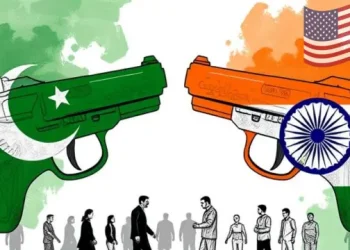By : Shahzada Ahsan Ashraf
Venezuela and Zimbabwe are two countries in recent times that have undergone severe economic crises, including hyperinflation and steep currency depreciation. While the symptoms were the same, the ways they got there were different.
Venezuela arbitrarily announced one fine day that the Bolivar (their local currency) was equivalent to the US Dollar. Obviously, no one accepted this, and they dumped Bolivares in such large quantities that the economy went into a tailspin from which it still hasn’t recovered.

Zimbabwe introduced abrupt and often violent land redistribution and reforms. This disrupted the economy in more than one way, and exports suffered. The government tried to address this by having several rounds of devaluation, which didn’t work, and productivity kept dropping. The currency was devalued to such an extent that it became worthless, after which the government introduced a new currency. That too didn’t work.
Two Extreme Approaches
Venezuela insisted on fixing its currency, while Zimbabwe seemed content with endless devaluation. These extreme approaches highlight the impracticality of either strategy, emphasizing the need for a flexible, data-oriented approach. Though their methods differed, the root cause of the crises remained the same: distrust and a loss of credibility.
Challenging times ahead for PKR
This is why traders are factoring in a 5-10% depreciation of PKR next year as Pakistan suffers from near zero growth, low productivity, higher repayments with fewer avenues for raising forex.
In the current scenario, the economy is grappling with a slowdown in imports (fresh LC openings), a decline in both exports and remittances, creating a stifling effect that is exacerbated by persistent inflation. However, a significant challenge emerges: allowing the Rupee to depreciate could trigger another round of inflation, posing a potential back-breaking burden for all stakeholders.
Inflation Emerges as Key Challenge
Average inflation for the first five months (July to November) is 28.62%, and if the SBP’s target of 22% for the whole year were to be considered, this would mean average inflation for the next seven months to be 17%. This looks highly unlikely as the mean consensus for the remaining year is 22.50%, a full 5% above the SBP’s expectations.
What Needs to Be Done
The two top things the authorities need to do is go all out to:
- Generate avenues for forex liquidity; the Army Chief’s visit may prove productive in this regard.
- Use administrative measures, including stricter controls on price hikes for essential goods like food and transport, to curb inflation.
Other than a lack of trust and loss of credibility, the one other common factor in Venezuela and Zimbabwe was political instability. This factor cannot be left unspoken.
Fed Surprises Markets
Although it hasn’t been officially declared, the end of the interest rate hike cycle appears imminent. This is evident from Powell’s statements, stating: “Committee members no longer see further interest rate hikes as appropriate, but they are also not ruling out such a possibility.” While there’s still a slightly open door for a return to increases, the likelihood is minimal and contingent upon a black swan event. This sentiment is supported by the Fed’s dot plots, which indicate a strong inclination towards interest rate cuts in the upcoming years.
Bonds Buying Picks Up
More than anything, the Fed’s signals have suggested that it may be safe to move back into bonds again. This caused yields to drop, with the Fed likely to target 10-year paper to consolidate at the 4% level. It wants financial conditions to ease to keep the economy from going into recession as those effects of tightening take effect.
Gold & Dollar Index
By the end of the week, there was renewed interest in buying gold, which should test its earlier high of $2,100 and most likely overtake it. The dollar index suffered as EUR, GBP, and most other currencies surged.
(The writer is a Former Chairman and Managing Director PIA, Former Federal Minister of industries and production)














